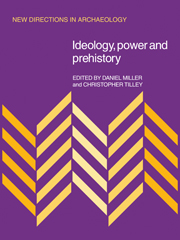Book contents
- Frontmatter
- Contents
- List of contributors
- Preface
- Part one Theoretical perspectives
- Part two Ideology and Power in the Present and Historical Past
- Part three Ideology and Power in Prehistory
- 5 Burials, houses, women and men in the European Neolithic
- 6 Economic and ideological change: Cyclical growth in the pre-state societies of Jutland
- 7 Ritual and prestige in the prehistory of Wessex c. 2,200–1,400 BC: A new dimension to the archaeological evidence
- 8 Ideology and the legitimation of power in the Middle Neolithic of Southern Sweden
- Part four Conclusions
- Index
5 - Burials, houses, women and men in the European Neolithic
Published online by Cambridge University Press: 05 March 2012
- Frontmatter
- Contents
- List of contributors
- Preface
- Part one Theoretical perspectives
- Part two Ideology and Power in the Present and Historical Past
- Part three Ideology and Power in Prehistory
- 5 Burials, houses, women and men in the European Neolithic
- 6 Economic and ideological change: Cyclical growth in the pre-state societies of Jutland
- 7 Ritual and prestige in the prehistory of Wessex c. 2,200–1,400 BC: A new dimension to the archaeological evidence
- 8 Ideology and the legitimation of power in the Middle Neolithic of Southern Sweden
- Part four Conclusions
- Index
Summary
A summary of the main approaches to the study of megaliths reveals how recent processual work that relates them to general principles fails to deal with the specificity of their variability, and their particular historical context. A systematic comparison between central and western European megaliths and central European long-houses in the 5th and 4th millennia reveals eight points of similarity. It is suggested that the tombs represent a transformation of the houses. This may be understood in relation to a transformation in the productive base and social organisation of the period. The specific form of the houses is related to the marking out and naturalisation of the position of women, and the importance of lineages at a time when labour was the key factor in the productive system. When the scarcity of land becomes predominant over the scarcity of labour, the emphasis changes from the domestic context of the home to the mediating properties of the supernatural expressed in the tombs, for control over the lineage. The evidence for Central and Atlantic Europe is compared.
The history of research on the megalithic monuments of western Europe provides a clear illustration of the deleterious effects of the split between historical and processual approaches in archaeology. In this paper, some of these effects will be illustrated, but then, using essentially the same material, an alternative approach will be examined. A perspective that treats the evidence as ideologically informed representations can resolve the previous dichotomies and indicate the potential in the study of prehistoric social relations.
- Type
- Chapter
- Information
- Ideology, Power and Prehistory , pp. 51 - 68Publisher: Cambridge University PressPrint publication year: 1984
- 13
- Cited by

